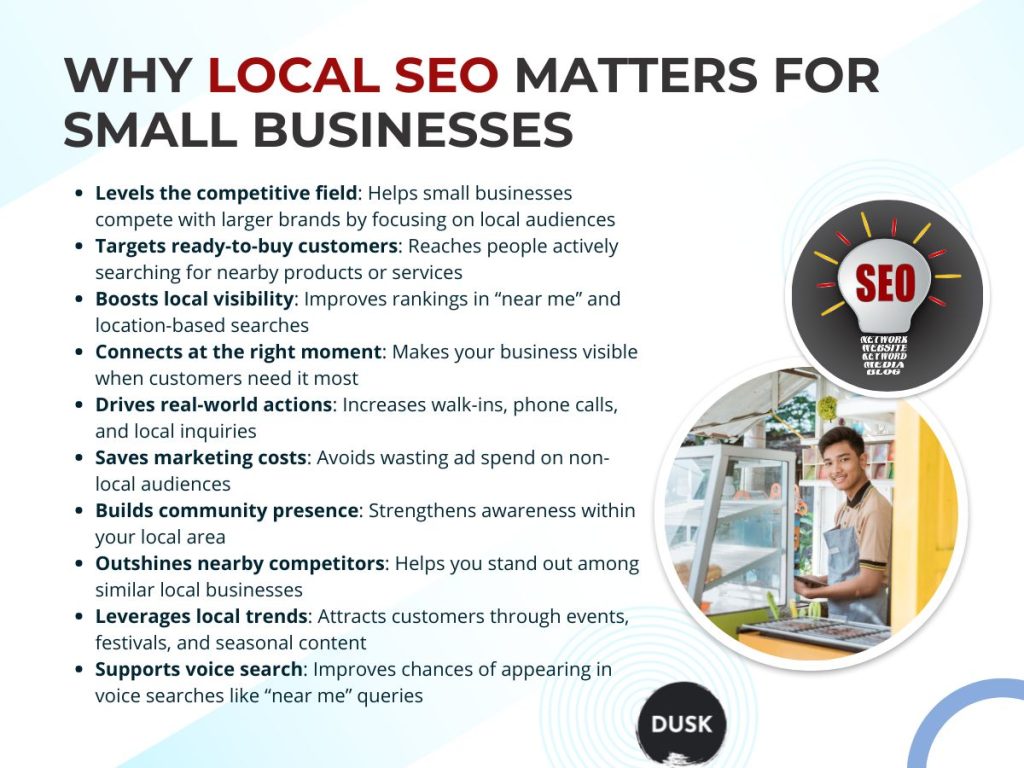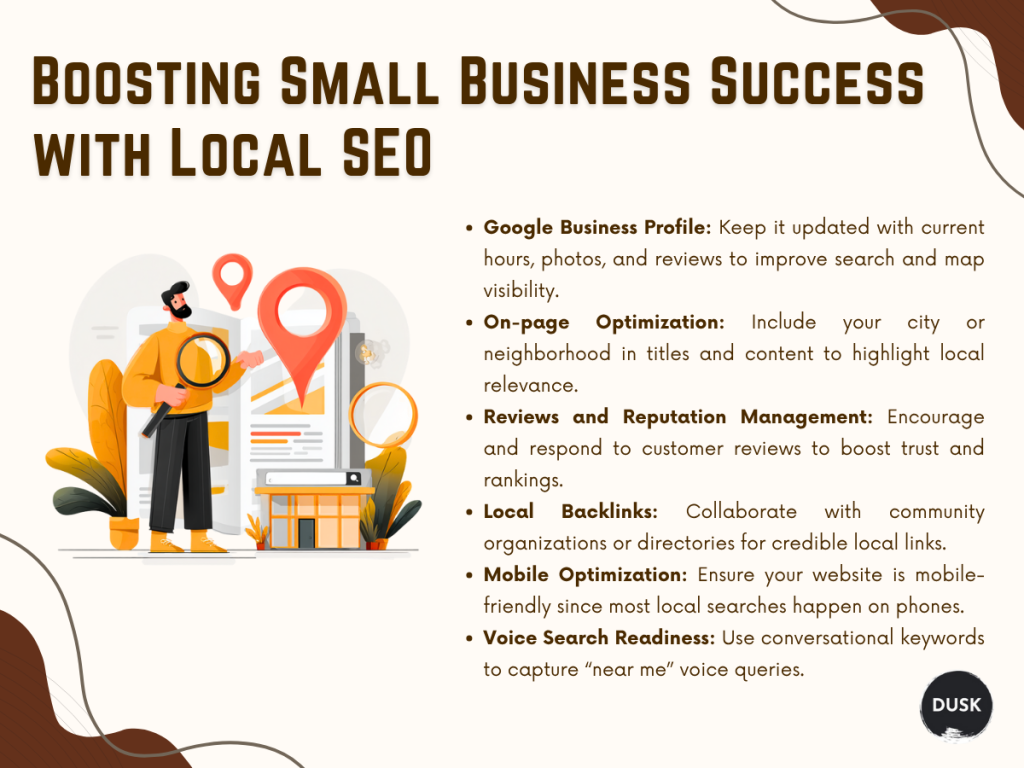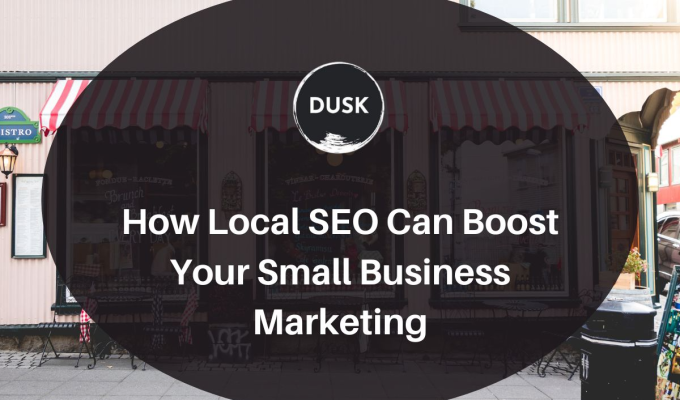Running a small business often feels like juggling ten tasks at once. You are focused on products, customer service, and day-to-day operations, yet at the same time you need to bring in a steady stream of customers.
The best roof for marketing success is not always traditional advertising like billboards or radio, it is Local SEO. The answer to “how local SEO can boost your small business marketing” lies in visibility, relevance, and trust in your community.
Why Local SEO Matters for Small Businesses
In today’s digital age, local SEO allows small businesses to level the playing field with larger competitors. As more customers rely on search engines to find businesses close to them, local SEO helps you directly target those in your immediate vicinity. Instead of competing on a global scale, you can focus on optimizing your presence for the most relevant audience, the local consumer. Whether you’re a restaurant, retail store, or service provider, optimizing for local search makes your business easier to find when it matters most.
For small businesses, being visible in the community is everything. You are not competing with the whole world but with nearby shops, service providers, and professionals. Local SEO helps you stand out in those “near me” searches that customers perform daily. When someone in your town looks for a bakery, a plumber, or a yoga studio, search engines deliver results based on location. If your business is not optimized, you may not even appear, no matter how good your services are.

Local SEO ensures your business appears exactly when and where people are searching. Unlike traditional marketing that casts a wide net, this strategy is about being hyper-relevant to your immediate audience. That relevance makes it easier to attract walk-ins, phone calls, and online inquiries without wasting money on ads targeting people outside your service area.
Local SEO is also a great way for small businesses to capitalize on hyperlocal trends. For example, creating content around local festivals, neighborhood events, or even seasonal activities can attract new customers who are already interested in the area, building on organic interest. Local SEO also connects directly with modern search habits like voice queries. Many people now ask assistants such as Siri or Alexa to “find a dentist near me.” If your content includes conversational, localized keywords, your business has a better chance of being recommended.
Building Trust with Local Customers
Building trust with local customers is a cornerstone of small business success. Local SEO provides a solid foundation for creating an online reputation, which is often the first step in making a good impression. Having an active presence on platforms like Google Maps and Yelp helps customers see you as a credible, reliable business. Moreover, consistency across all platforms (your website, social media, and business listings) ensures that search engines and customers alike trust your information.
When potential customers can see detailed business hours, menu options, or product offerings, it eliminates any uncertainty about whether your business can meet their needs. The more visible and accurate you are online, the more likely customers are to engage with your business. In fact, studies show that 84% of customers trust online reviews as much as personal recommendations, making this one of the most impactful ways to increase local trust.
When customers see your business listed on Google Maps with updated hours, reviews, and photos, they feel reassured. People often make purchasing decisions based on online reviews and local reputation before they ever visit a store. By managing your Google Business Profile, encouraging reviews, and maintaining accurate details, you show potential customers that your business is active and reliable.
Key Elements of Local SEO

Local SEO involves several moving parts that work together to improve visibility. While it may sound technical, the basics are straightforward and manageable with consistency. The foundation of strong Local SEO is your Google Business Profile. This is where customers find your location, hours, reviews, and photos. Keeping this updated is as essential as keeping your storefront clean and welcoming.
On-page Optimization
Your website should reflect your community focus. Adding your city or neighborhood name to titles, headings, and content helps search engines understand your relevance. For example, instead of “Best Coffee Shop,” a stronger title would be “Best Coffee Shop in Downtown Austin.” Adding blogs about community events, neighborhood guides, or local tips not only strengthens your SEO but also positions you as part of the community.
Reviews and Reputation Management
Encouraging happy customers to leave reviews not only boosts rankings but also convinces others to give your business a try. Responding to reviews, both positive and negative, shows professionalism and builds stronger customer relationships. Over time, those reviews serve as a digital form of word-of-mouth, a marketing channel small businesses have always relied on.
Local Backlinks
Partnerships with local organizations, sponsorships, or community involvement can result in backlinks from local websites. These links act like digital endorsements, strengthening your visibility and authority in search results. Listings in smaller but trusted directories such as Yelp or TripAdvisor also add valuable credibility when they are consistent with your core information.
Mobile Optimization
Most local searches are performed on mobile devices. If your website is not mobile-friendly, you risk losing potential customers who quickly bounce off to a competitor with a smoother experience. Mobile-first design ensures your business looks trustworthy and easy to engage with at any time.
Local SEO Tactics and Their Benefits
| Tactic | How It Helps Small Businesses | |
| Google Business Profile | Increases visibility in local searches and maps, provides accurate business info, and builds trust with updated details. | |
| On-page Optimization | Strengthens search relevance by including city or neighborhood keywords in titles, headers, and content. | |
| Reviews & Reputation | Boosts credibility, convinces new customers, and signals activity to search engines. | |
| Local Backlinks | Acts as digital endorsements from local organizations, driving both traffic and authority. | |
| Mobile Optimization | Ensures smooth experience for users searching on phones, reducing bounce rates and improving conversions. | |
| Voice Search Readiness | Captures “near me” and conversational queries from voice assistants like Siri and Alexa. | |
Local SEO is much more than just tweaking your website for a few keywords. One key element is “NAP” consistency; your business’s name, address, and phone number, which should be identical across all online platforms. Inconsistent information can confuse search engines and potential customers, leading to missed opportunities. Moreover, having your NAP details on multiple, reputable online directories reinforces your credibility.
The more trusted platforms that link to your business, the stronger your SEO signal becomes. This is why local directories like Yelp or Angie’s List matter; they provide valuable backlinks that improve your rankings. Local SEO also includes optimizing images, videos, and your website for mobile devices, as over 60% of searches are now done on smartphones. The easier your business is to find, the better your chances of standing out in your local market.
Measuring the Impact of Local SEO
Measuring the impact of local SEO is essential for understanding how your efforts translate into real business results. Small businesses often invest in SEO without knowing which strategies are effective, so tracking key indicators becomes crucial. Important metrics to watch include:
- website traffic from local searches
- click-through rates on Google Business Profile
- calls, inquiries, and messages from online listings
Using tools like Google Analytics, Google Search Console, and customer surveys helps quantify the value of your SEO activities.
Monitoring performance over time allows you to strengthen high-performing tactics and improve areas with weaker results. This data also reveals how nearby customers behave such as which services attract the most interest or which search terms lead people to your business. For example, a café may discover that searches like “best cappuccino near me” bring in the most foot traffic. Insights like these guide smarter marketing decisions, more targeted promotions, and better content creation.
Local SEO measurement also offers competitive advantages. By evaluating how competitors rank, the keywords they target, the reviews they receive, and the directories they appear on, you can identify gaps and opportunities in your own strategy. These insights such as needing more reviews, improving service descriptions, or gaining stronger local backlinks help you outperform nearby businesses.
Overall, integrating measurement into your local SEO approach leads to stronger visibility, better customer understanding, and more effective long-term growth.
Making Local SEO Part of Your Marketing Strategy
To truly benefit, Local SEO should not stand alone but integrate into your larger marketing plan. Social media posts that include local hashtags, blog content that discusses community events, and email campaigns tied to local promotions all reinforce your local footprint.
When Local SEO is part of your wider marketing, every effort works together to increase visibility and engagement. For example, posting about a local charity drive on your social media, adding it to your website news page, and updating your Google Business Profile all signal to search engines and customers alike that your business is rooted in the community. Measuring these efforts with Google Analytics helps you see which campaigns drive real results, allowing you to adjust and focus on what works best.
Long-Term Benefits
ocal SEO offers small businesses a sustainable, cost-effective way to attract consistent customers. Unlike paid ads that disappear when the budget ends, Local SEO continues to build visibility, trust, and growth over time.
Key Benefits
- Ongoing Results: Unlike paid ads, Local SEO continues to deliver traffic and visibility even after the initial work is done.
- Cost-Effective Marketing: It provides long-term visibility without the need for constant spending on advertising.
- Stronger Local Presence: Optimized rankings help your business become the default choice for locals searching for your services.
- Reputation Growth: Positive reviews and optimized content build lasting authority and customer trust.
- Sustainable Cycle: Visibility and trust reinforce each other, creating a self-sustaining growth loop.
- Brand Recognition: Over time, Local SEO builds brand awareness and loyalty, surpassing many traditional marketing channels.
Conclusion
The best answer to the question of how local SEO can boost small business marketing is simple: it puts your business in front of the right people at the right time. It builds trust, increases local visibility, and creates sustainable growth. By focusing on accurate listings, reviews, localized keywords, and mobile-friendly design, small businesses can compete with larger players in their communities. Local SEO is not just about ranking higher; it is about becoming the go-to option when neighbors are searching for your services.






